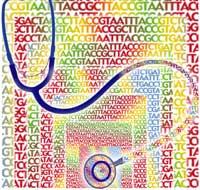Regardless of whether you know you are at risk for Alzheimer’s

By means of a blood test, a bit of saliva, or any other sample that may contain the cell itself, anyone can easily know if they have a genetic predisposition to suffer alzehimer, breast cancer, hypercholesterolemia, or other diseases throughout their lives.
When the answer is negative, that is, when there are no extraordinary risks, analysts get very happy and relax a lot. Of course. Problems arise when the result is positive. Your knowledge can traumatize, depress, or involve anyone in a situation of despair.
Researchers at the University of Boston began in 2000 with the Alzheimer's Risk Assessment and Education research. The choice of Alzheimer's is because it is a disease that for the moment has no remedy and that, therefore, can pose a risk of sinking for anyone.

The presence of a certain gene increases the risk of suffering Alzheimer's in old age.
Among his relatives were chosen volunteers with Alzheimer's members for research and, in particular, the APOE gene was analyzed in the DNA of volunteers. This gene contains information for the synthesis of a certain protein present in the liver, brain, kidneys, etc., being able to contain three variants in humans, APOE2, APOE3 and APOE4.
The protein resulting from the APOE3 gene is a normal protein, but not the other two forms, and the APOE4 gene protein is related to alzheimer's. People who have a copy of this gene have the triple risk of developing Alzheimer's and those who have both genes of this type, the risk is fifteen times higher.
The analysed persons were divided into three groups, in which the responses of the different types of results were detected. Some were given good news because they were told that their genes had no generic APOE4. Others were given bad news and those of the last group did not clarify what type of genes they had.
They were not surprised to see what calm was left those who had no special risk, that is, those who did not have generic APOE4. However, they found it remarkable that a year after receiving the news, those who knew they had a “bad” gene were in a similar emotional state and did not know what kind of genes they had. Neither better nor worse.
Do not despair, resist

According to a study published in the British Medical Journal, many times people at higher risk of developing a certain disease are left behind and despair because they believe that what they do is develop the disease, which is what they have written in the genes.
That is not always so. Written information in certain genes does not define an immovable future: there are interactions between many genes and many external factors to our body influence our body, such as feeding and lifestyle. In the case of Alzheimer's, for example, a study published in the journal Science reveals that a third of people affected by Alzheimer's do not have APOE4 gender, and that there are people with both APOE4 genes who do not develop the disease.
Published in 7K.
Buletina
Bidali zure helbide elektronikoa eta jaso asteroko buletina zure sarrera-ontzian











